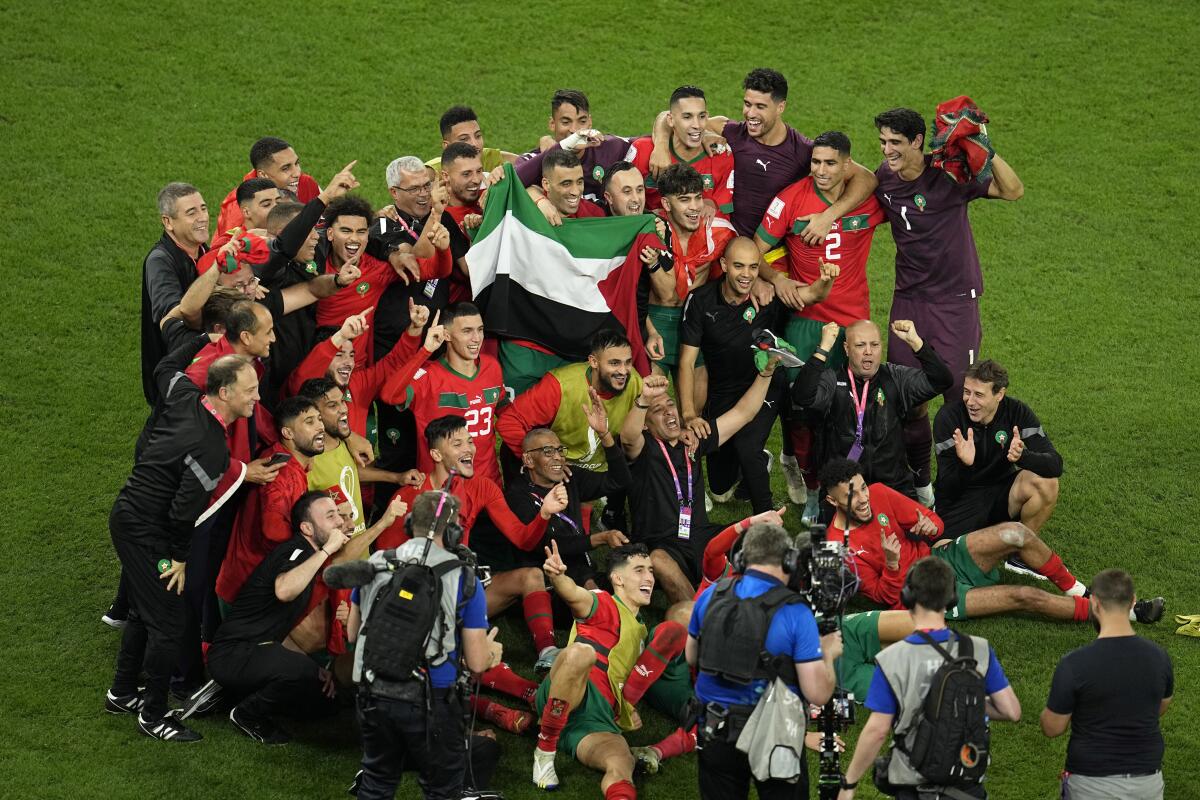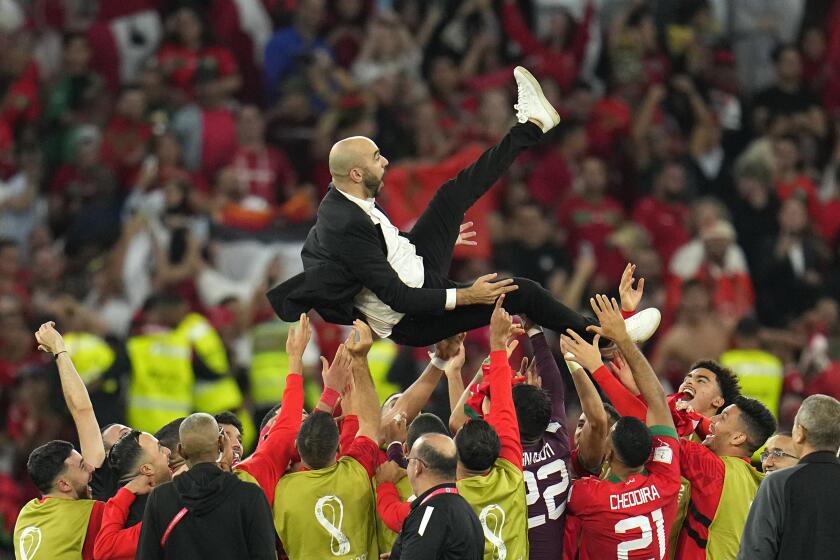Palestinian cause takes center stage at the World Cup

- Share via
DOHA, Qatar — The ball arced into the net, sealing Spain’s surprise ouster from the World Cup amid the deafening roars of the crowd in Education City Stadium. As the Moroccan squad gathered for a photo, some players celebrated the moment by waving the country’s flag. But it was another flag the team held front and center.
The red, white, black and green Palestinian flag has been a ubiquitous presence in the stands and on the soccer pitch here at the Middle East’s first World Cup.
In a tournament beleaguered by hard questions as to what constitutes permissible expression and whether politics have a place in sporting events — Qatari authorities have at times prohibited fans and players alike from sporting LGBTQ symbols or signs denouncing the Iranian government — the Palestinian cause has taken center stage.
In one match, a Tunisian fan ran onto the field with a Palestinian flag trailing behind him. After their team defeated Belgium early in the tournament, Moroccan supporters launched into song in support of Palestinians. When Israeli forces killed five Palestinians late last month, Arabs in the stands chanted, “With our souls, with our blood, we will sacrifice for you, O Palestine.”
“Every North African and Middle East team has made sure that the Palestine issue is prominent at every game,” tweeted Mark Ogden, an ESPN reporter.
Girding that support has been the surprisingly strong showing of Arab teams in a World Cup marked by upsets. Though Saudi Arabia and Tunisia are both out, their respective victories over powerhouses Argentina and France spurred a rare surge of regional solidarity. Meanwhile, when the Atlas Lions — as the Moroccan team is known — made history as the first Arab squad to advance to the World Cup’s quarterfinals, celebrations erupted across the region and in expatriate communities around the world.
“A victory for any Arab team is a victory for all Arabs,” said Nizar Ahmad, a 27-year-old nurse from Jordan who works in Qatar and attended Morocco’s match against Canada. “We’re like the fingers of a fist.”
He made his hand into a fist to emphasize his point.
Morocco has used close ties among its players and coach to fuel its historic World Cup success, landing the team a spot in the quarterfinals.
Even in a region that has long rallied around the Palestinian cause, the outpouring of sentiment has been striking.
“Morocco, Algeria, Tunisia, all these people support Palestine,” said Amina Hazza, a teacher from Jordan who works in Qatar. “We feel we have to support each other. If any Arab country wins, then Palestine wins.
“Right now, Palestinians are scattered all over the world,” she said. “But here we’re just happy to be together and to share this feeling.”
Mohammad Qadhi, a Qatari who was walking with a friend along Doha’s waterfront, said the Arab people were sending a message to the world: “Don’t forget Palestine. Don’t ignore the Palestinian issue.”
The displays have served as a counterpoint to the Abraham Accords, the 2020 deals that saw the United Arab Emirates, Bahrain, Morocco and Sudan move
to normalize relations with Israel.
The U.S.-brokered agreements were meant to augur a new phase in Israel’s relationship with the Arab world. To some, the accords were evidence that the Palestinian cause no longer mattered to many Arab governments, and that the so-called Arab street — battered by decades of conflict, revolutions and economic malaise — had more pressing issues to deal with.
More significantly, they were supposed to forge a closeness between Israelis and their Arab neighbors. But like Israel’s decades-old peace deals with Jordan and Egypt, the new agreements appear to have brought governments together while relations among their citizens remained mostly tepid.
In a poll published in July, the Washington Institute for Near East Policy think tank found a distinct lack of popular support for the Abraham Accords. Even in the United Arab Emirates, arguably the most enthusiastic Arab party to the agreements, only a quarter of respondents viewed the accords positively. Roughly half the population in the Persian Gulf opposed business and sports ties to Israel even without normalization.
For many Palestinians, the outpouring of support among the fans at the World Cup felt like vindication.
“When the Abraham Accords were signed, the No. 1 question everyone asked us [was] if we as Palestinians felt alienated,” said Diana Buttu, a Palestinian lawyer based in Haifa, Israel. “Israelis assumed the Arab world would just come with open arms.
“At the time I said to them these are security arrangements between separate countries. And that’s all they are. There is no people peace.”
In Doha, Israeli journalists reporting on the World Cup have been mostly shunned. One reporter, Raz Shechnik, who works for the daily Yediot Aharonot, posted videos of interactions he had with fans who outright refused to speak to an Israeli outlet. At one point, he said, the Israeli crew posed as Ecuadoreans so as to be able to do their work.
“We feel hated,” he wrote.
Ohad Hemo, a reporter for Israel’s Channel 12, said the Israeli media were spurned “because we represent normalization.”
“Israelis’ wish came true, we signed peace agreements with four Arab states,” he said in a conversation with the channel’s anchor. “But there are also the people, and many of them don’t like our presence here.”
Baxter reported from Doha and Bulos from Riyadh, Saudi Arabia.
More to Read
Sign up for Essential California
The most important California stories and recommendations in your inbox every morning.
You may occasionally receive promotional content from the Los Angeles Times.













